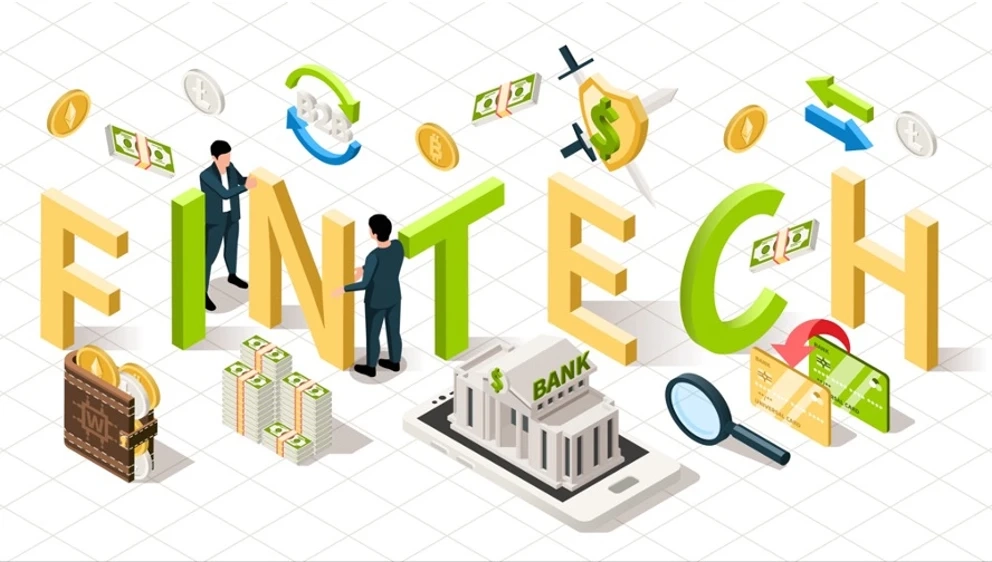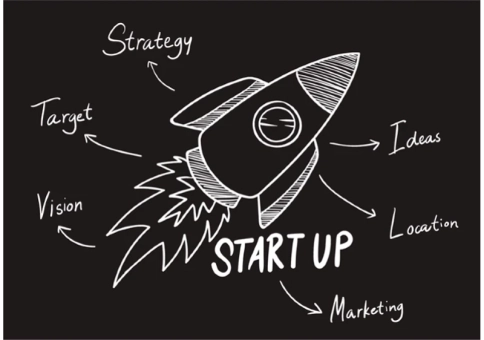IT Solutions for Financial Industry: Fintech Guide From Fetocan
In the world of finance, there is one word that's been making waves recently — “fintech”. It's not just a buzz term, it's a force transforming the way we deal with money, make payments, and plan our financial futures. The fintech industry has already changed the reality, giving numerous opportunities both for users and financial companies.
In this post, we'll explore what fintech is and how fintech solutions are playing a significant role in shaping the future of the money world. Let's take a walk through the planet of fintech, where innovation meets finance, and where fintech developers are the architects.
Image by pch.vector on Freepik
FinTech Revolution — How Technologies Are Transforming the Industry
Since the first appearance of fintech software, it has completely changed the way we deal with money. And several financial technology companies have become the pioneers of this transformation. Names like PayPal, Square, Stripe, and Adyen have become synonymous with innovation, easy transactions, and smooth financial management. These companies have not only changed the way we make payments but have also inspired a new era of financial technology services. There are top fintech companies known to everyone and their dog, and numerous startups climbing the ladder of the fintech industry right now.
Here are some of the groundbreaking fintech innovations that have reshaped the industry:
- Mobile payments. The rise of mobile wallets and apps like Apple Pay and Google Wallet has made it easier than ever to make secure, contactless payments with a simple tap of your smartphone.
- Digital currencies. Cryptocurrencies like Bitcoin and Ethereum have gained widespread attention and are seen as potential alternatives to traditional currencies, revolutionizing the concept of money itself.
- Peer-to-Peer lending. Platforms like LendingClub and Prosper have disrupted traditional lending institutions by connecting borrowers directly with individual lenders, eliminating the need for traditional banks.
- Robo-Advisors. Companies like Wealthfront and Betterment have introduced automated, algorithm-driven investment advisory services, making wealth management more accessible and affordable.
- Blockchain technology. Beyond cryptocurrencies, blockchain has found applications in supply chain management, voting systems, and more, offering transparency and security in various sectors.
- RegTech Solutions. Regulatory technology (RegTech) companies like ComplyAdvantage and Chainalysis are streamlining compliance and risk management, helping financial institutions stay on the right side of the law.
- Open banking. Regulations like PSD2 in Europe have paved the way for open banking, allowing customers to share their financial data securely with third-party providers, fostering competition and innovation.
- Artificial Intelligence. AI is being used for chatbots, fraud detection, credit scoring, and customer service, enhancing efficiency and personalization in financial services.
- Big Data analytics. FinTech companies are harnessing vast amounts of data to gain insights into customer behavior, improve risk assessment, and enhance decision-making.
These innovations are not only making financial services more convenient and accessible but are also challenging traditional institutions to adapt and innovate or risk becoming obsolete. The fintech revolution is far from over, and there is still lots of free space for innovation.
Image by vectorjuice on Freepik
The Challenges of the Financial Industry
Traditional financial institutions still keep their ground, and it’s hard to imagine the world without the traditional banks or credit cards. Yet. There are numerous challenges that traditional institutions are facing and that financial technology companies can help with.
- Regulatory issues. The financial industry operates under a web of complex regulations originally designed to ensure stability and protect consumers. However, keeping up with the constantly changing regulatory requirements can be a daunting task. Compliance demands substantial resources, time, and expertise, making it one of the hardest challenges for traditional institutions, and one of the opportunity points for fintech software development companies.
- Security concerns. As the digital landscape expands, so do the threats to cybersecurity. Traditional financial institutions are prime targets for cyberattacks, and safeguarding sensitive customer data and financial transactions is paramount.
- Customer expectations. The digital age has seriously changed customer expectations. Today's consumers demand seamless, convenient, and personalized experiences — no one wants to spend half of their day in a bank anymore. And traditional institutions seem to struggle to meet these expectations.
- Legacy systems and technical debt. Many established financial institutions rely on aging infrastructure and legacy systems. These systems are not only costly to maintain but also inhibit agility and innovation. Untangling the web of technical debt is a complex task for these organizations, and the need for advanced software for financial services is obvious.
- Competition from fintech startups. The innovation of fintech startups pose a direct threat to traditional institutions. Startups can swiftly adapt to market changes, introduce disruptive technologies, and capture market share, often without the bureaucracy and legacy constraints faced by their older counterparts.
- Digital transformation and cultural shift. Embracing digital transformation requires not just technology and fintech automation, but a cultural shift within traditional institutions. Overcoming resistance to change, fostering a culture of innovation, and retraining employees is the process that not every institution can handle.
- Data management. Managing and extracting insights from vast volumes of data can be a significant challenge for traditional financial institutions. To compete effectively, they must harness the power of data analytics while ensuring privacy and security.
- Evolving customer demographics. The customer base is evolving, with younger generations favoring digital-first experiences. Traditional institutions must adapt their services and communication channels to cater to these changing demographics.
Navigating these challenges requires a delicate balance between innovation and the core values of trust, stability, and reliability that traditional financial institutions have built over decades. In this dynamic landscape, the only winning strategy is the collaboration between traditional players and fintech innovators.
Image by pch.vector on Freepik
Key Areas Of FinTech Development
So what are we actually talking about when talking about IT solutions for financial services? Here are some of the significant developments facilitated by fintech:
Payments and transactions
IT solutions have pivoted a monumental shift in the way payments and digital transactions are processed. Gone are the days of writing checks or carrying loads of cash. Instead, we now rely on a multitude of electronic payment options, all made possible by technology. Applications like Apple Pay, Google Pay, and Samsung Pay have transformed smartphones into digital wallets, allowing users to make secure and convenient payments with a simple tap or swipe. Moreover, digital currencies like Bitcoin and Ethereum are challenging the very notion of traditional currency, offering decentralized, borderless, and transparent transaction capabilities. Contactless payments, often backed by Near Field Communication (NFC) technology, have also gained widespread acceptance. They allow for swift and secure transactions without the need for physical contact with payment terminals.
Lending and credit
Fintech developments have completely changed the way people deal with lending and debt. Traditional banks often had lengthy and complex loan origination processes. Fintech has streamlined and expedited this process considerably. Credit scoring, a cornerstone of lending decisions, has been transformed through data analytics and machine learning. These technologies analyze vast datasets to assess a borrower's creditworthiness more accurately. They take into account not only traditional credit history but also non-traditional factors, providing a more holistic view of an individual's financial situation.
Wealth management
The world of wealth management has seen a significant shift towards IT-driven solutions. Personalized wealth management platforms and robo-advisors are gaining traction, offering tailored investment strategies to individuals. These platforms leverage algorithms and data-driven insights to construct and manage investment portfolios. They factor in individual goals, risk tolerance, and market conditions to make real-time investment decisions. As a result, wealth management is becoming more accessible and affordable, reaching a broader range of investors.
RegTech and Compliance
Ensuring regulatory compliance is a vital concern in the financial industry. Traditional institutions grapple with mountains of paperwork and complex regulatory frameworks. RegTech solutions facilitate regulatory compliance and reporting by automating tasks. They offer real-time monitoring of transactions and customer data, flagging any suspicious activities that might indicate financial misconduct. Automated compliance checks ensure that institutions adhere to regulations without the need for extensive manual oversight.
Security and data protection
In the digital age, cybersecurity is a non-negotiable aspect of FinTech, due to the sheer volume of sensitive financial data and transactions occurring online. IT solutions play a pivotal role in safeguarding financial data and transactions. Advanced encryption techniques ensure that data remains confidential and secure. Multi-factor authentication and biometrics add extra layers of security, protecting user accounts from unauthorized access.
These are just several areas where financial software development influences the current state of events. The actual impact is much wider, with a variety of software development companies competing for the chance to make the industry better while gaining significant profits.
The Future of FinTech: Trends to Follow
If you are considering entering the financial world and creating your own fintech platform or other product, here are some of the trends that you can use for inspiration.
1. AI Making Banking Smarter
AI is revolutionizing the way banks operate. It enables computers to mimic human thinking and decision-making and is being used to improve financial models, enhance security, and provide more personalized services. AI's ability to analyze large amounts of data is also reshaping how banks work.
2. Blockchain Transforming Finance
Blockchain technology is a secure and transparent way to record financial transactions. It's particularly valuable for creating digital currencies and making financial transactions more secure and efficient. Blockchain eliminates the need for intermediaries like banks, reducing costs, and increasing trust.
3. Cloud Computing Empowering Finance
Cloud computing involves using remote servers to store and manage data. It's helping financial institutions save money, streamline operations, and enhance security. Cloud technology provides the flexibility and scalability needed to adapt quickly to changing demands.
4. Smart Devices Enhancing Trust
Smart devices, such as smartphones and wearables, play a significant role in building trust in financial transactions. They enable secure and convenient authentication methods, which are crucial for activities like mobile banking and online payments. Additionally, these devices collect valuable data that can improve financial services.
5. User-Friendly Software Solutions
No-code and low-code software platforms simplify the process of creating applications. Even those without extensive technical knowledge can design apps with ease. These platforms are empowering businesses to innovate quickly and efficiently, reducing development time and costs.
6. Automation Reshaping Workflows
Robotic Process Automation (RPA) and advanced automation technologies are taking over repetitive tasks within the financial sector. RPA involves using software robots to perform rule-based activities. This automation enhances efficiency, reduces errors, and allows businesses to respond rapidly to customer demands.
These trends are driving significant changes in the world of finance, making services more efficient, secure, and accessible. As technology continues to advance, the fintech industry will adapt and innovate to provide better financial solutions for everyone — and your company might be one of the players in this game.
How Fetocan Can Help You Build FinTech Solutions
At Fetocan, we're all about helping you succeed in the world of B2B FinTech. We have solid domain expertise, and all the trends mentioned above are something we already work with.
Our team doesn't just know tech — we understand the financial world inside out. We get the complexities, the rules, and the unique needs of the financial services software development. So, whether you want to build a super-smart AI financial model or streamline your business with blockchain magic, we know how to turn those dreams into reality.
In a world of fintech, we're your partner. We offer a wide range of services and solutions to implement your financial ventures and bring your company to the next level. So, let's team up and shape the future of finance together, one innovative solution at a time.
FAQ
- What are the main programming languages and technologies used for fintech development?
The main fintech languages include Python, Java, Ruby, JavaScript, and frameworks like React and Angular. Besides, technologies like blockchain, AI, and cloud computing play a significant role in development.
- How much does it cost to develop a fintech application?
The final cost of development varies depending on the project’s complexity, features required, and the team size and location. On average, a simple fintech app may cost between $50,000 to $100,000. However, it's better to get a customized quote based on your specific requirements.
- How can I find the best fintech development company to develop my project?
Look for teams with a track record of successful fintech projects, expertise in the relevant field, and a deep understanding of financial specifics. Fetocan has a proven history of developing innovative fintech solutions, so the easiest way is to contact us and get a quote.











